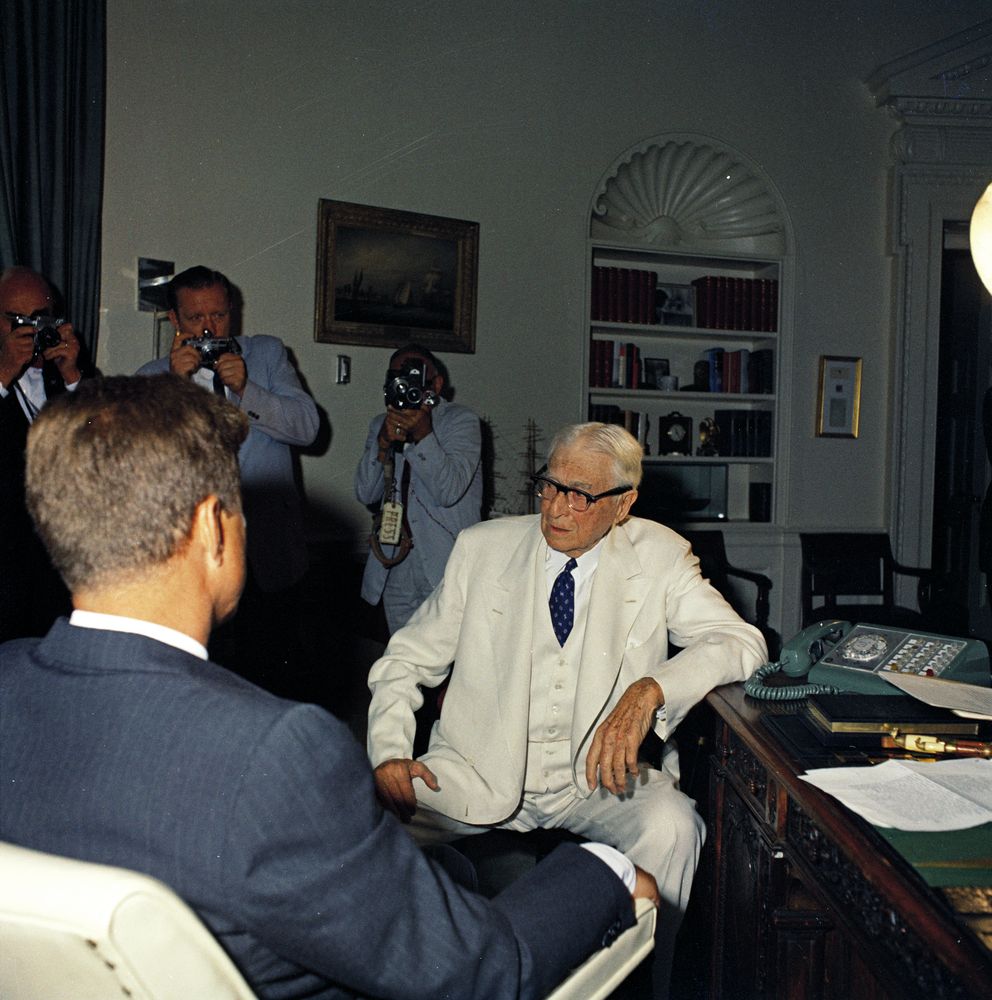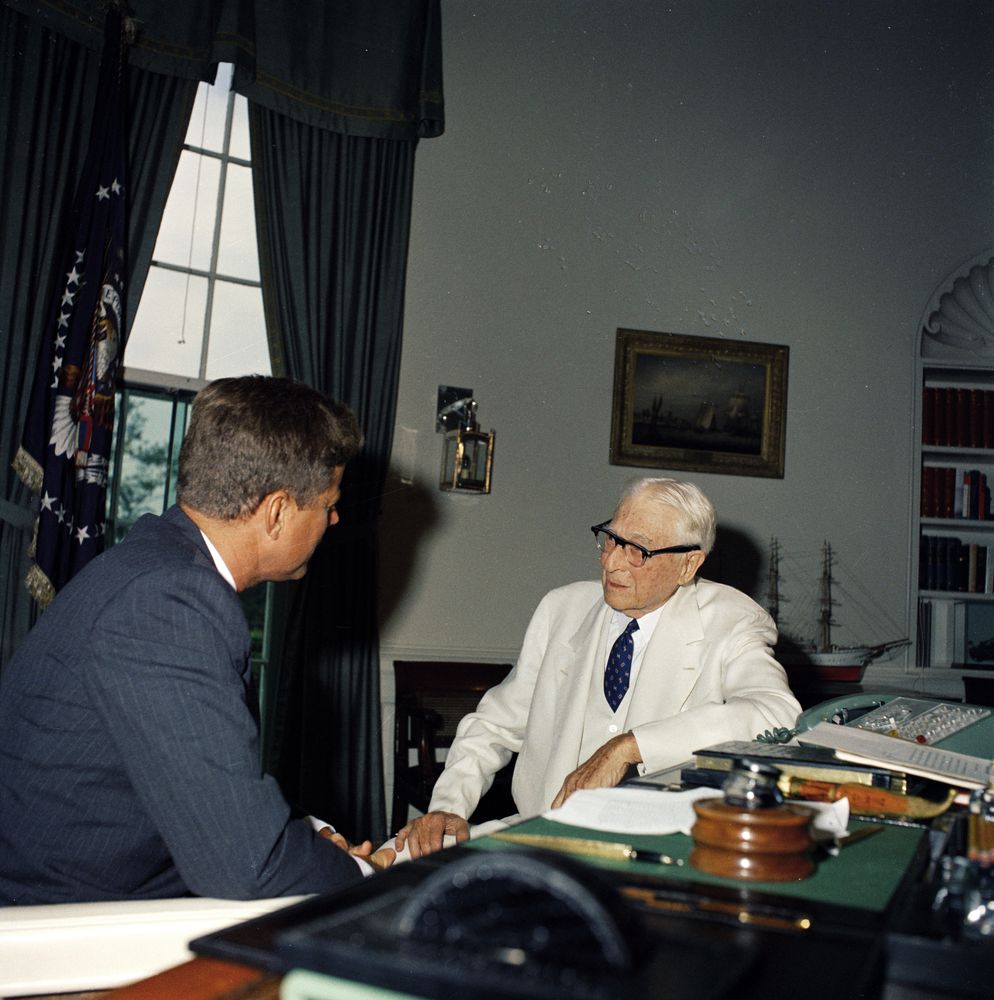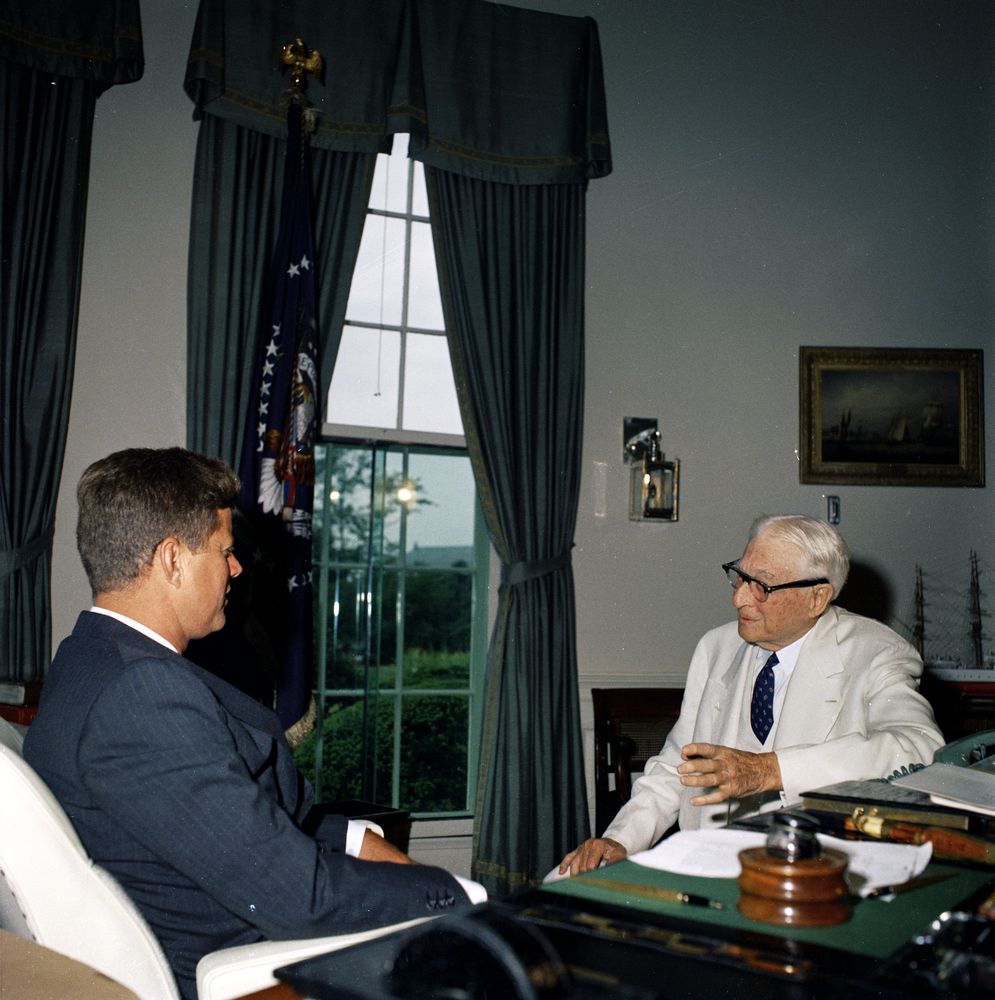30.01.2019
Bernard Mannes Baruch is a trillionaire who is now little known
The real master of the World should not be widely known, he should stand behind the backs of public rulers and guide them in their affairs. This is due to the fact that the work of the ruler is sometimes associated with unpopular, and even dangerous, for himself, decisions. History knows many examples when unlucky rulers were thrown into prison, or even deprived of their heads, regardless of their august blood, or their worldwide fame and former merits.
The real Master of the Situation simply needs the ability to rake in the heat with someone else's hands, while not pretending that he has anything to do with what is happening ... About one of these "gray cardinals" Stories will go speech in this article. His name is Bernard Mannes Baruch. This man is little known in Russia, and in his “native” USA is now also thoroughly forgotten, but judging by his deeds, he left no less trace in history than Stalin, Roosevelt, or Churchill ...
He was born in the same year as Ulyanov-Lenin, but on the other side Globe - in South Carolina, in the family of a German immigrant of Jewish origin, physician Simon Baruch. In 1881 the family moved to New York and the young Bernard entered City College, where he successfully graduated and began work as a broker on the New York Stock Exchange ... Many years later, he will write his book "My own story", in which will describe this period in detail. The most heartbreaking scene from the stories about that period was the story of how a novice broker borrowed the last money from his father to play on the stock exchange ... however, it seems to me that Baruch was very modest in this place. 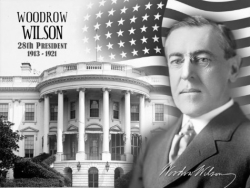
Further, without entering into any trusts, which were very popular at the time, Bernard runs a very successful brokerage business, earning himself the nickname "The Lone Wolf of Wall Street", and by the age of thirty-three he becomes a millionaire (according to the current purchasing power, this is more than $ 100 million. ). By the way, the formation of Baruch as a millionaire took place during the years of incessant crises in the United States, but it is rightly said: who is the war, and who is the mother ... : he finances the election campaign Woodrow Wilson... Baruch contributes $ 50,000 to the Democratic Foundation. In gratitude for his support, Wilson introduces him to the Department of National Defense, and during the First World War, Baruch becomes the head of the military-industrial complex (Military-Industrial Committee) And nobody is embarrassed that he is not a military man or an industrialist, but a speculator and financier. Baruch actively lobbies for the participation of the United States in the First World War, as he understands perfectly well that a war on foreign soil will give the United States an economic breakthrough, which, in fact, happened. The United States came out of a series of crises for a while. At the same time, already, as an adviser to the president, Baruch suggested to Wilson the "correct" position regarding the Fed. In 1913, the US government delegated the power to print money to a commercial entity to the Federal Reserve System. What this monster has become now - everyone knows.
For its long and busy life (1870-1965) Bernard Baruch was an advisor to 5 (!) US presidents, and before recent years life he took an active position and had a lively mind. 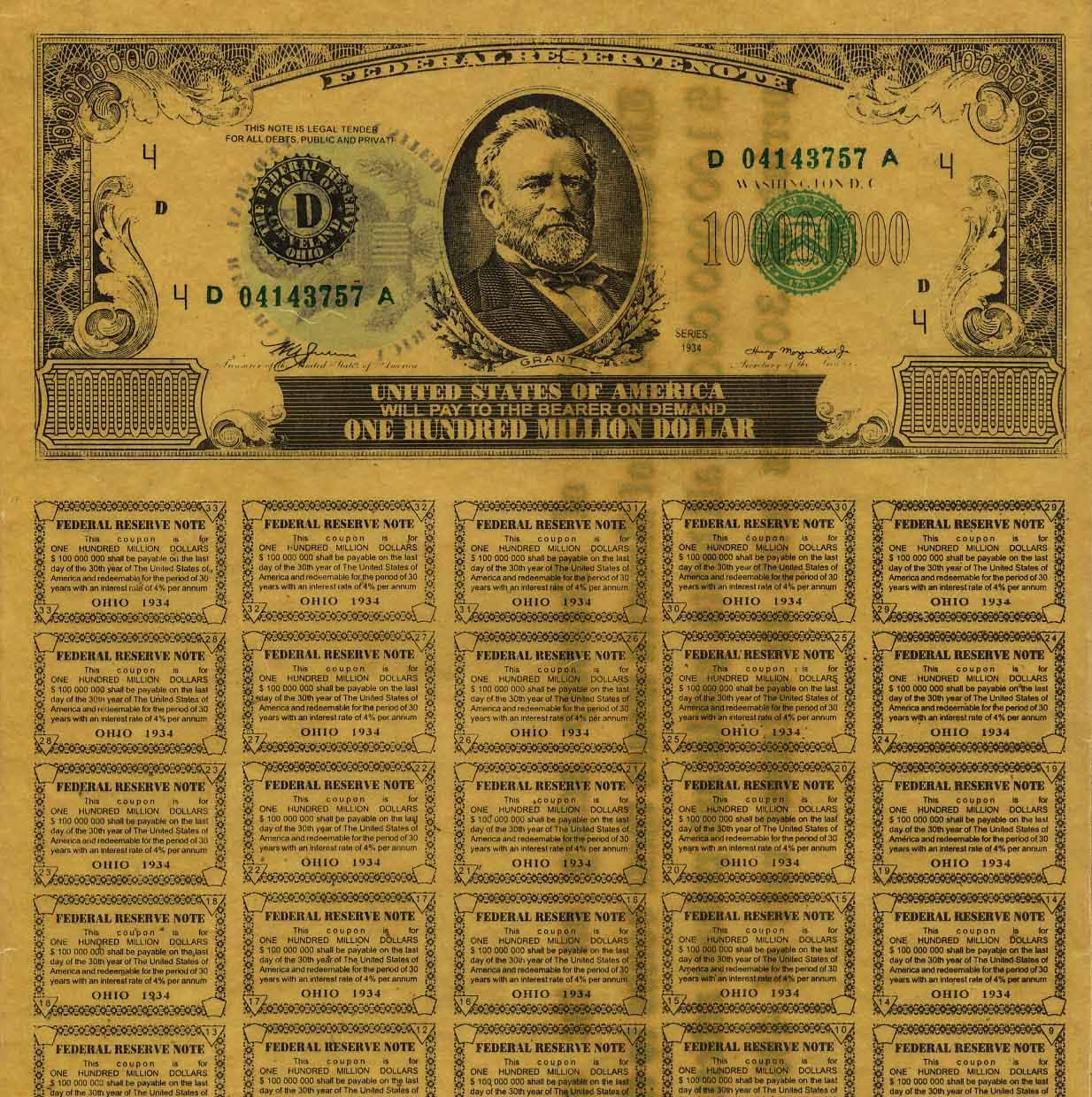 In 1934, Bernard Baruch and US Treasury Secretary Henry Morgenthau carried out an unprecedented operation to exchange Chinese gold reserves for a bundle of paper bonds. Cornered Chiang Kai-shek, pressed by Mao and threatened by Japanese intervention, agreed to this "exchange." At stake was at least 100 tons of gold bullion and a huge amount of silver, jewelry and antiques. Dealers from the United States received everything, and Chiang Kai-shek received 250 sheets of paper, and a quiet old age is held in high esteem on the island of Taiwan.
In 1934, Bernard Baruch and US Treasury Secretary Henry Morgenthau carried out an unprecedented operation to exchange Chinese gold reserves for a bundle of paper bonds. Cornered Chiang Kai-shek, pressed by Mao and threatened by Japanese intervention, agreed to this "exchange." At stake was at least 100 tons of gold bullion and a huge amount of silver, jewelry and antiques. Dealers from the United States received everything, and Chiang Kai-shek received 250 sheets of paper, and a quiet old age is held in high esteem on the island of Taiwan.
Here's how the German lawyer Arthur Stern describes it on his website:
Under a special secret the gold was sent in 11/13/1933. from Shanghai to San Francisco on an American heavy military cruiser “Houston“. This transaction was arranged for a bearer through the U.S. Federal Reserve and Chiang Kaishi personally received a trust in the amount of $ US 25.000.000.000. (Nr. SC1226-71-B004; D 04143701 A)The trust was designed by a financier and advisor of President Roosevelt -
A high-resolution scan of one such bond was downloaded from the same site. You can also view and download images of both sides of this extraordinary document on our website, on the page: "Primary Sources".
By the early forties, Baruch was already a billionaire, but the peak of profits from his near-political business fell on the years of World War II and the post-war nuclear race. Pearl Harbor may have been a surprise to some, but not to him. However, they had to sacrifice thousands of lives and an entire military base, since the United States again, without a war on foreign territory, again could not solve its internal problems... Baruch solved in parallel both the problems of his country and the tasks of his own enrichment.
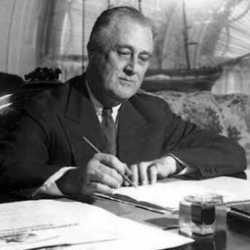 In 1944, destroyed Europe and the USSR agreed in the American Bretton Woods to recognize the US dollar as the world reserve currency, isn't this an exhaustive proof of the effectiveness of such a policy?
In 1944, destroyed Europe and the USSR agreed in the American Bretton Woods to recognize the US dollar as the world reserve currency, isn't this an exhaustive proof of the effectiveness of such a policy?
Baruch had a strong influence on the distribution of state military orders. Billions of dollars went by the course Baruch had charted. After World War II, Baruch oversaw the US Nuclear Program, and already atomic industry The United States bowed to the patriarch of presidential advisers. By the way, the expression "Cold War" was first heard from his lips. It happened on 04/16/1947, in a speech before the House of Representatives of South Carolina, to indicate the conflict between the United States and the USSR. “Baruch wants to rule the world, the Moon and, possibly, Jupiter - but we'll see that later,” President Truman once wrote in his diary ... This quote clearly shows who really made significant decisions and who was just preparing for an answer ... And here is a very interesting and rare photo: Churchill, Baruch, Eisenhower, with Baruch in the center and above the others ... 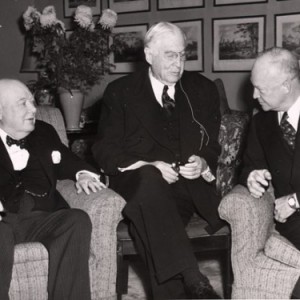
Until a ripe old age, Baruch was personally involved in business, and was able to outlive his peer Ulyanov by 40 (!) Years. There is information that by the end of his life the assets of the firms and funds under his control reached a trillion dollars. A colossal amount, even in our times ...
Despite all of the above, Baruch was very easy to communicate, regularly met with common people: I talked in the park with soldiers, sailors, employees, found out what their moods and wishes were, moreover, there was no guard near him ... ![]()
Baruch fed the most better feelings to your children. He was the father of two daughters and one son, however, their life did not work out the way his father dreamed: the daughters did not give birth to grandchildren for him, and the son did not fulfill the wishes of the parent. He was married many times, but led a life that casts a shadow on his great father ...
After his death, Baruch's body was laid to rest in a simple cemetery in Queens, on the outskirts of New York. No fences, no pompous monuments, only a modest small slab on the lawn, next to his wife, who died many years before him ... 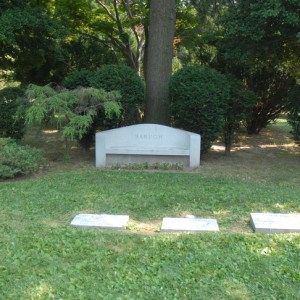
I tried to build genealogical tree Barukhov, but met with a serious problem: there is information about his parents, there is about children, there is something about the parents of the parents, but there is nothing about the grandchildren, great-grandchildren, and great-great-grandchildren of Bernard Mannes Baruch ... In the USA, services to find the burial places of that , or another person, and those who wish can easily find the address and place in the cemetery of the hero of this article by surname, name and year of birth. It is not difficult to find the burial place of his son: Bernard Baruch Jr., who died already in the nineties of the twentieth century, but then there is emptiness. Someone cleared out all the information with a powerful hand. Also can't find good photos from the funeral of Bernard Baruch, probably there were law successors who did not want to shine in public ... There are also a lot of questions ... Baruch Jr. had children - the legal heirs of grandfather's trillion, where are they? Baruch the elder had nephews and grand-nephews, how was their fate? Who is currently managing these colossal assets? After all, these assets should be no less than the assets of the Rothschilds, or the Rockefellers ...
Back in 1770, William Peet noted: "There is more than a king behind any throne."
Oddly enough, little has changed since then, and sooner or later all revolutions and social transformations are brought to the same denominator - submission to the golden calf.
In order to substantiate what has been said, I will share some materials about the activities of a person about whom they now know little and do not write.
In the 50s and 60s of the last century, the well-dressed liked to walk in Washington and New York central parks a tall man rather respectable in appearance.
Often, people would sit down next to him on the bench, in which passers-by recognized the largest statesmen and businessmen. The colorful figure of Winston Churchill was especially prominent. The name of this sociable and smiling man was Bernard Mannes Baruch, whose fortune exceeded a trillion dollars by the end of his life, although he never appeared on the lists of the richest people.
The special attitude to this man is evidenced by the fact that in 1960 on the 90th anniversary of the park in front of the White House a memorial bench was erected in his honor.
In the unspoken table of the ranks of the secret tycoons of the world economy and geopolitics, the Baruchs are much higher than the Rockefellers, Rothschilds and others like them.
Bernard Baruch was the first to see in the close interaction of capital with power a way of concentrating in his hands the levers of control over world processes.
Lenin's one-year-old, he was born in South Carolina into the family of a German immigrant doctor, Simon Baruch.
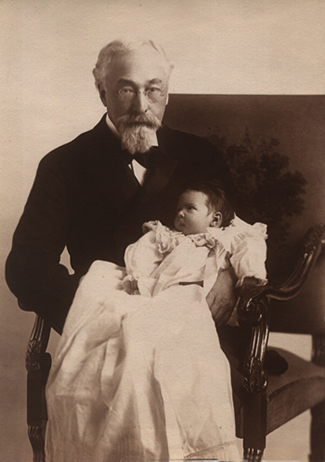
In 1881, the Baruch family moved to New York and the young man Bernard entered City College, after graduating from which he worked as a broker on the New York Stock Exchange, and in 1903 founded his own brokerage company.
From this moment, the style of activity begins to be seen the richest man on the ground.
Contrary to the then fashion for merging into trust companies, Bernard Baruch conducts his rather successful brokerage business alone, for which he receives the nickname "The Lone Wolf of Wall Street".
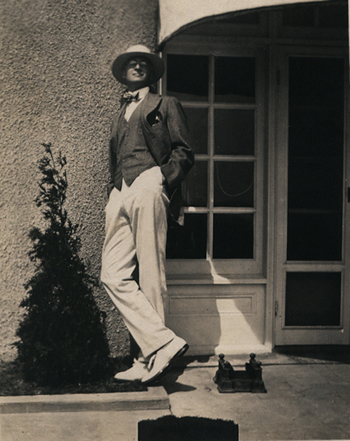
By the age of thirty-three, Baruch becomes a millionaire, and what is remarkable is that he manages to increase his capital in the context of the incessant crises in the United States.
Since 1912, Baruch has been playing the political card by financing Woodrow Wilson's campaign.
In gratitude for his support, Wilson introduces him to the Department of National Defense.
During the First World War, Baruch became the head of the US Military Industrial Committee and spins the flywheel of the arms build-up, which allows for some time to overcome a series of crises in the country's economy.
It was Baruch, as an adviser to the president, who persuaded Wilson to support the idea of \u200b\u200bcreating the Federal Reserve, and since 1913, the US government has delegated the authority to produce dollar bills to a commercial structure - the Federal Reserve System.
After the revolution in Russia, Baruch unexpectedly became a supporter of cooperation with The Soviet Union... Together with Hammer and Harriman, Lenin invites him to recovery national economy Countries of the Soviets.
Some of the first factories built by Americans in Russia in 1920-1930 were tractor factories in Volgograd, Kharkov and Chelyabinsk.
Of course, these factories had a dual purpose: in addition to tractors, they began to produce tanks, armored vehicles and other weapons.
The vehicles necessary for the army were produced at two main factories - Gorky and them. Likhachev, which was built with a subsidy from Henry Ford in the 1930s.
American companies have also built two huge steel plants - in Magnitogorsk and Kuznetsk.
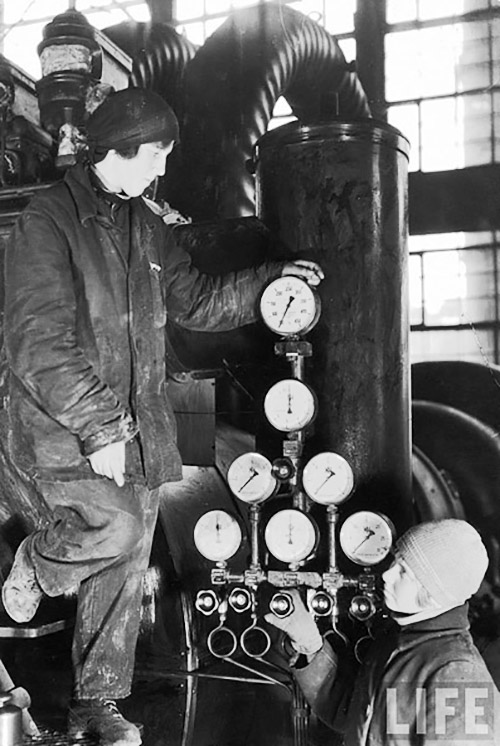
Anticipating the development of the situation in the world, Baruch, with the American and British bankers in solidarity with him, carried out a creative maneuver in the late 1920s.
He seeks to reorient the American economy to serve the military-industrial complex through its artificial collapse and plunge into a crisis state.
He demonstrates his actions to the rather promising British politician Winston Churchill, whom he invites to America under the pretext of giving lectures.
On October 24, 1929, on the day of the crash of the New York Stock Exchange, Baruch brings Churchill to Wall Street.
While an excited crowd was raging outside the New York Stock Exchange, he shares with Churchill that he stopped playing the stock market a year before the crash, sold all his shares and bought US government bonds instead, ensuring that his capital from depreciation. ...
This made a huge impression on Churchill, and since then their friendship with Baruch has acquired not only a personal character, but also features of a strategic partnership.
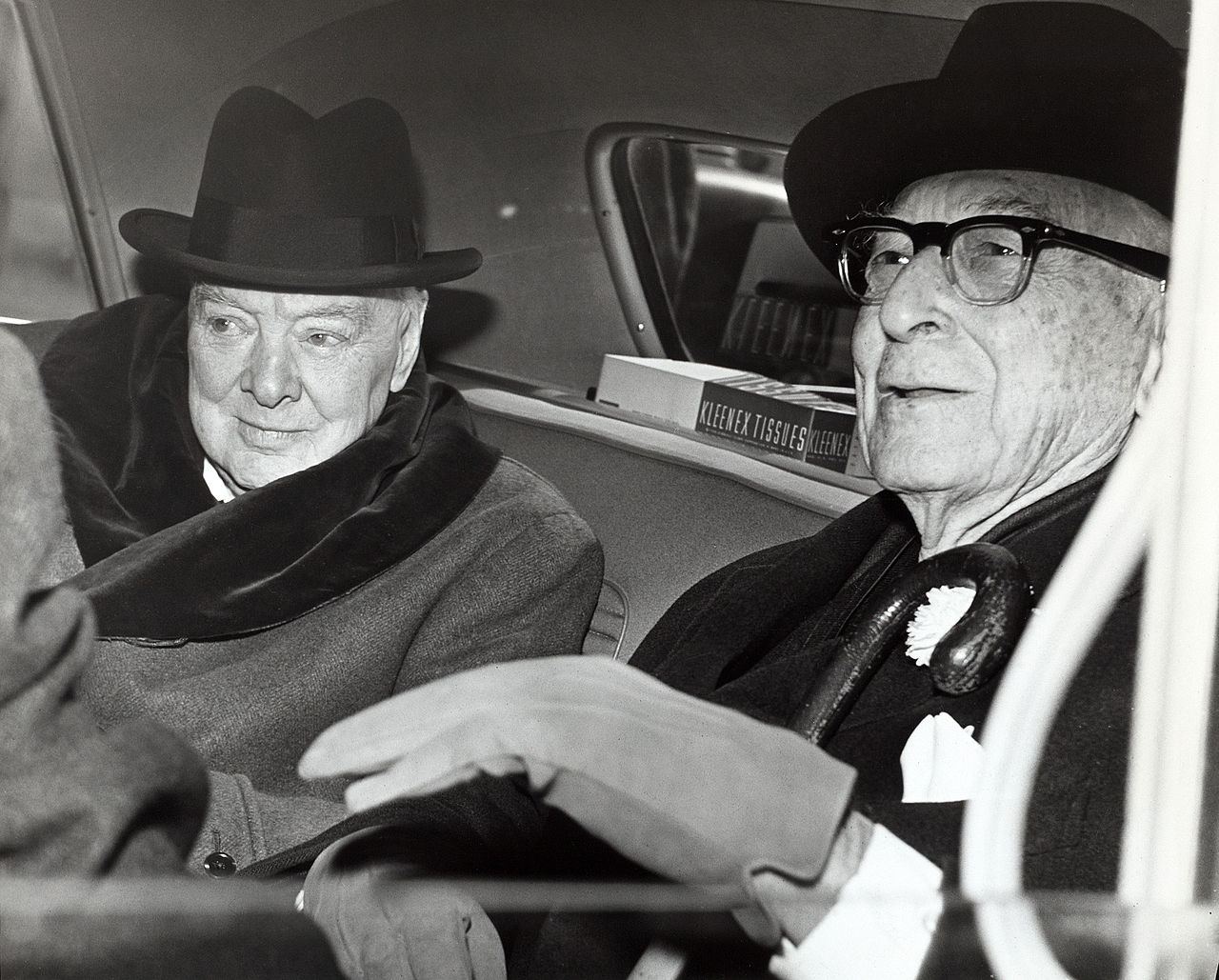
It was Baruch and Churchill who became active organizers of the game of strengthening, and then pushing their heads against Germany and the USSR.
Hitler's press secretary Ernst Hanfstangl (who, by the way, introduced the Nazi salute into the ritual) confirmed that first Churchill's son Randolph accompanied Hitler on his famous pre-election flights "Hitler over Germany", and then Churchill himself wished to meet with Hitler at the hotel " Kaiserhof ”, but Hitler refused him.
However, grievances are insults, and the plan needs to be implemented, and in January 1933 Hitler was nevertheless promoted to power.
The corresponding steps were taken in the east of Europe.
In the same 1933, the United States fully established diplomatic relations with the USSR, and Bernard Baruch meets with prominent American politicians in America the Soviet plenipotentiaries: Maxim Litvinov and Yevgeny Rozengolts, in order to develop a joint line of conduct.
It should not be forgotten that after the revolution Litvinov was the Bolshevik envoy in London and in December 1917 wrote a very curious letter of recommendation to the British diplomat and intelligence officer Lockhart about Trotsky: "I consider his stay in Russia useful from the point of view of our interests."
Of course, Baruch's interests were not limited to European theater.
In 1934, in collaboration with US Treasury Secretary Henry Morgenthau, he conducted an unprecedented operation to exchange Chinese gold reserves for a bundle of paper bonds.
Cornered Chiang Kai-shek, suffering one defeat after another, agreed to this "exchange", as a result of which businessmen from the United States received at least 100 tons of gold bullion and a huge amount of silver, jewelry and antiques, and Chiang Kai-shek - 250 sheets of paper and calm old age on the island of Taiwan.
By the early 40s, Baruch was already a billionaire, but the peak of dividends from his business involved in politics fell on the years of World War II and the post-war nuclear arms race.
The Japanese attack on the American naval base at Pearl Harbor on December 7, 1941 may have come as a surprise to some, but not to Baruch and the banking oligarchy.
From the declassified documents about the attack on the base, it follows that President Roosevelt, Alain Dulles and the banking elite knew about the intentions of the Japanese, but went on to destroy the fleet and kill thousands of their fellow citizens.
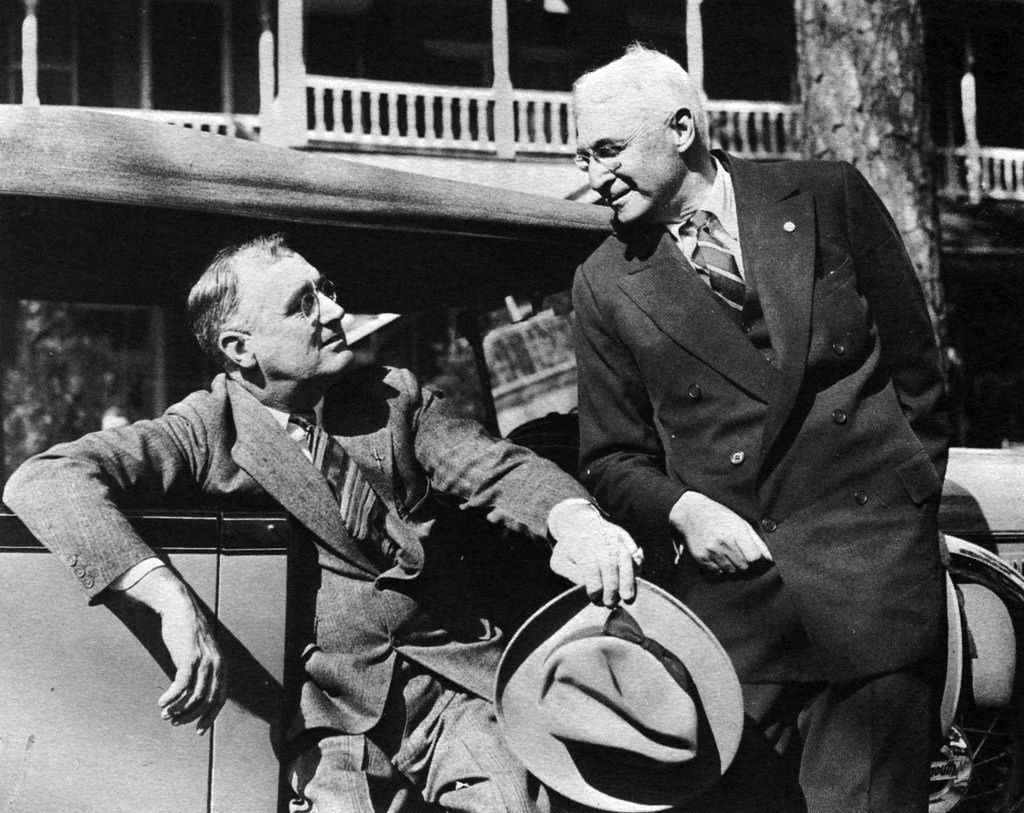
At the cost of this provocation, America was dragged into the Second world war, and the oligarchs, and first of all Baruch, hit a huge jackpot.
After the war, exposing materials were leaked to the press. The Americans, of course, were horrified, since Roosevelt was an ideal for many, but the declassified documents were not disclosed, and the languages \u200b\u200bwere shortened to those who made them public.
During World War II, Baruch continued to advise the government and exerted a strong influence on the distribution of state military orders. Billions of dollars went to finance the directions they proposed.
In 1944, thanks to the skillful play of Baruch and his partners in Bretton Woods, war-torn Europe and the USSR agreed to recognize the US dollar as the world's reserve currency.
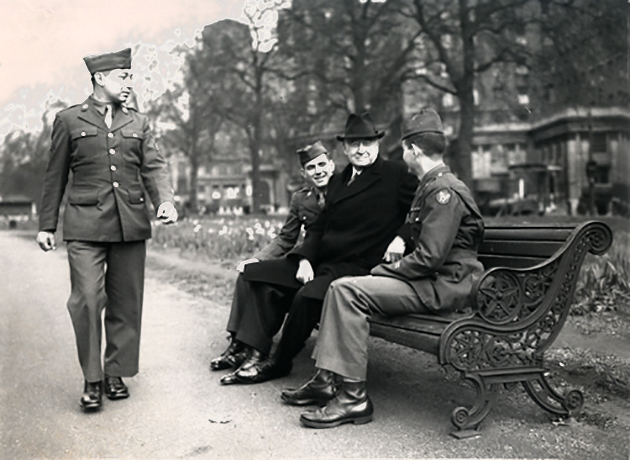
After World War II, Baruch took over the US nuclear program and took over the nuclear industry.
Incidentally, the expression "cold war" does not belong to Churchill at all. It was first sounded from his lips in a speech before the House of Representatives of South Carolina on April 16, 1947 to indicate the severity of the conflict between the United States and the USSR.
“Baruch wants to rule the world, the Moon, and possibly Jupiter, but we'll see that later,” President Truman wrote in his diary.
This phrase clearly demonstrates who actually made significant decisions, and who envied, but could not openly oppose.
With the beginning of the arms race, which brought fabulous profits to the contractors of the American military-industrial complex, Baruch personally supervised the production of the American atomic bomb under the motto: "We must go forward with the atomic bomb in one hand and a cross in the other."
French nuclear physicist Frederic Joliot-Curie recalled:
“When I was in America, the famous banker Baruch, the representative of the United States in the UN Commission on atomic energy, suggested that I move to work in the USA. He promised me mountains of gold on condition ... however, you understand what that condition was! I refused, of course. But they took revenge on me. "
Soon the daughter of the great scientist, Irene, who visited the United States at the invitation of the Anti-Fascist Emigrant Aid Committee, was imprisoned, and in 1950, under pressure from the Americans, the French government freed the physicist from the leadership of the Atomic Energy Commission.
After the demonstration of the power of the United States by the atomic bombing of the Japanese cities of Hiroshima and Nagasaki on August 6 and 9, 1945, the Soviet Union took all measures to restore nuclear parity.
In this situation, the United States hastened, on the one hand, to convince world community in their peaceful aspirations, and on the other, they carried out a clever combination with the aim of subordinating America to the development of nuclear energy throughout the world.
Of course, the initiator of such a large-scale plan was none other than Baruch, whom President Harry Truman appoints as the US representative to the UN Atomic Energy Commission.
At its very first meeting on June 14, 1946, the American delegation announced a plan for the total prohibition of nuclear weapons, which went down in history as the "Baruch Plan".
Outwardly, the plan seemed to envisage good goals, however, assumed the conduct of international inspections by the UN Commission on nuclear power while giving her the authority to take coercive measures against violators. Moreover, its decisions would not be subject to the veto of the permanent members of the UN Security Council.
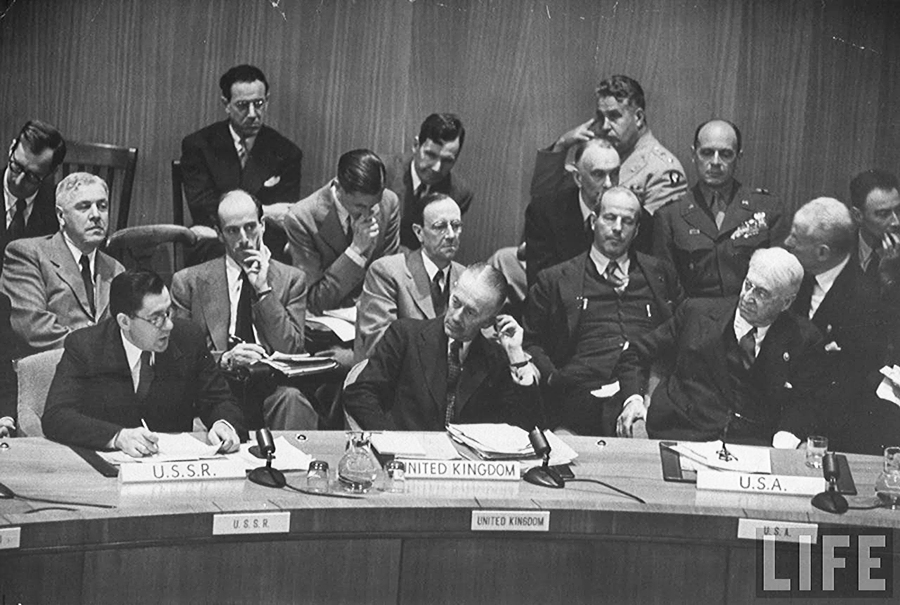
And here Baruch's plans collided with the distrust of Stalin, who understood that their implementation would slow down the USSR's movement towards creating its own nuclear potential, necessary to ensure its own security.
The Soviet delegation at the UN conference took advantage of the fact that the American proposals were fundamentally at odds with the UN Charter and its structure, and vetoed.
It is very interesting that the American diplomat and historian B. Bechhofer, who took part in the disarmament negotiations, noted: "Baruch's position on the veto is an extreme example of his isolation from the general line of US foreign policy."
How did it end for Baruch? And nothing.
Since 1949, a nuclear arms race began in the world, accompanied by the development of tactics and strategies of ideological sabotage, where Bernard Baruch felt like a fish in water.
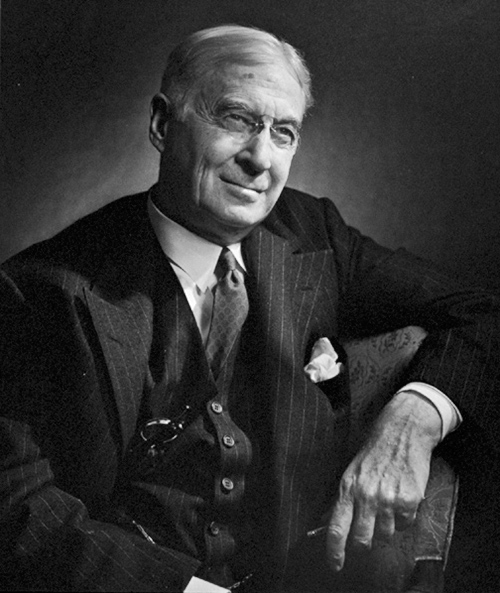
Until a ripe old age, Baruch was personally involved in business. By the end of his life, the assets of firms and funds under his control reached a trillion dollars.
Surprisingly, the arbiter of destinies did not hide from people, he was very easy to communicate, talked with vacationers in the park, found out what their moods and wishes were, and there was no guard near him.
Baruch died in 1965 in a simple cemetery on the outskirts of New York - next to his wife, who had died many years earlier. There are no fences or pompous monuments on his grave. Just a modest little stove on the lawn.
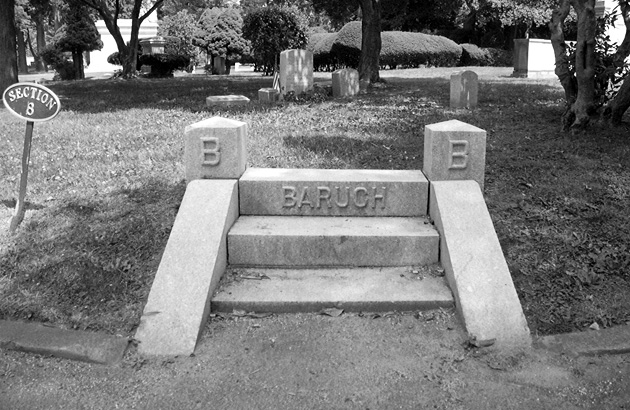
Unusual is not the modesty of the most influential person on the planet of that time - many prominent figures showed modesty.
It is surprising that today nothing is known about the heirs of the trillionth state of Bernard Mannes Baruch - his grandchildren and great-grandchildren. Someone with an omnipotent hand deleted all the information.
There are no collective photographs from the funeral of Bernard Baruch, since they were probably attended by his successors, who did not want to appear.
Who now manages the colossal assets of the owner of the trillion dollar fortune is unknown.
In September 2013, an inventive person did a curious experiment.
He walked for a couple of days along 6th Avenue to Central Park in New York in a T-shirt with a picture of Baruch on his chest, and on the back there was the inscription: “Mom! Why my grandfather isn’t Baruch? ”, Which translated into Russian means:“ Mom, why isn't my grandfather Baruch? ”
During these voyages, his wife, who followed a few meters behind, was filming.
At the beginning of the avenue, only a few people paid attention to him, and one girl boasted that she knew where Baruch College was.
“There are a host of five-star hotels near Central Park, and each of them has conference rooms ...
The masters of life slowly floated down the street, but when they met me, their eyes, previously accommodated to infinity, fished out of space the portrait of Baruch, and their gaze became interested.
When I was equal with them on the sidewalk - they turned their heads and read the inscription on my back. Further, their eyebrows crawled onto their foreheads, and the question was read in their eyes: who the hell are you?
My experiment gave unexpected results: ordinary Americans do not know Baruch ... For the majority, his portrait was just information noise, but there was a layer of people for whom Baruch is not just six English letters.
These people know very well who he is, since his deeds, hidden in the fog of the past, and the deeds of his successors in the present, are included in the circle of their vital interests ... "
One of the leaders of the influential anti-globalization movement gives an interesting example of his communication with the former US Treasury Secretary Robert Rubin, who showed him the already printed banknotes in denominations of over a thousand dollars.
These banknotes no longer bore portraits of the presidents.
Rubin said: “Presidents are serfs, but where are the slave owners” - and showed notes with portraits of Baruch, Schiff, Loeb, Kuhn.
However, the richest financiers in the world do not store their wealth in well-known banks.
Try to find information about "Standard Charter Bank", founded already in 1613. Some similar branches in Hong Kong and in some places are still lit up, but the bank itself is not on any list, but it controls all settlements in the world.
And all this is conducted by the families of Baruchs, Loeb, Schiffs and Coons, who became related to each other.
Financier Bernard Baruch at a meeting with John F. Kennedy on July 26, 1961.
Of course, a lot has changed since the active work of Bernard Mannes Baruch. Gone are the days when a billionaire could safely walk in the park, sit on a bench and talk with passers-by.
A veil of secrecy has surrounded the world of the untouchables, and they no longer need to communicate with people. This means that people have become consumable for the embodiment of the plans of the hermits.
And when we watch crocodile tears pouring from the eyes of Western politicians over the suffering of residents in Aleppo or elsewhere, then we must immediately recall their absolute indifference to the civilians who died under the bombing in Yugoslavia, Afghanistan, Iraq, Libya and the controlled the government of the territories of Syria.
It must be understood that all this is done to manipulate the opinion of the average person. After all, he, the man in the street, is the main supplier of cannon fodder for the slaughter in the interests of those who are closer to the breath of the golden calf, initially devoid of conscience.
American financier, stock speculator and political consultant. Having succeeded as a businessman, he became a consultant on economic issues for US presidents Woodrow Wilson and Franklin Delano Roosevelt.
Bernard Baruch was born in Camden, South Carolina (Camden, South Carolina), in the family of Simon (Simon) and Belle Baruch (Belle Baruch). His father was an immigrant from Germany, of Jewish origin; he moved to the States in 1855. During the American Civil War, he was a surgeon on the staff of renowned Confederate General Robert E. Lee; in addition, he became one of the pioneers and founders of physiotherapy. According to Bernard's autobiography, Simon Baruch was also a member of the Ku Klux Klan - back in the days when anti-Semitic sentiments in this movement were weakly expressed.
In 1881, the Bernard family moved to New York ( New York City); Eight years later, Baruch graduated from City College of New York. After graduation, Bernard moved to brokers; after a while he rose to a partner in "A.A. Housman & Company". For $ 18,000, Baruch bought himself a place on the New York Stock Exchange; by the age of 30, he had already made himself a solid fortune - mainly by speculating in sugar. In 1903, Bernard opened his own brokerage firm; he flatly refused to join the already existing financial firms, thus earning himself a reputation as a sort of "lone wolf of Wall Street." By 1910, Baruch was already one of the country's most famous financiers.
During World War I, Bernard advised US President Woodrow Wilson on national security issues; At that time he held the post of chairman of the Council of the military industry (by the way, he was stenographed at that time by the then unknown Billy Rose, the future poet and impresario). Baruch rendered big influence to turn the American economy on a war footing. By the end of the war, Bernard attended the Versailles Peace Conference with Wilson.
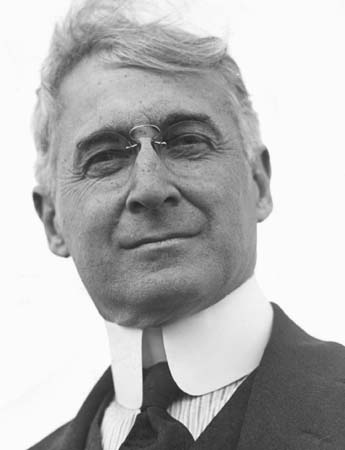
During President Roosevelt's "New Deal", Baruch was a member of the "Brain Trust"; later, largely thanks to Bernard, the National Recovery Administration (NRA) was created.
Baruch also worked on the basis of international relations - he was involved in this aspect of the country's life on a par with the Rockefellers, Morgans and Warburgs. Before World War I, Bernard was "worth" a million dollars - or a little more; after the war, its "value" increased 200 times.
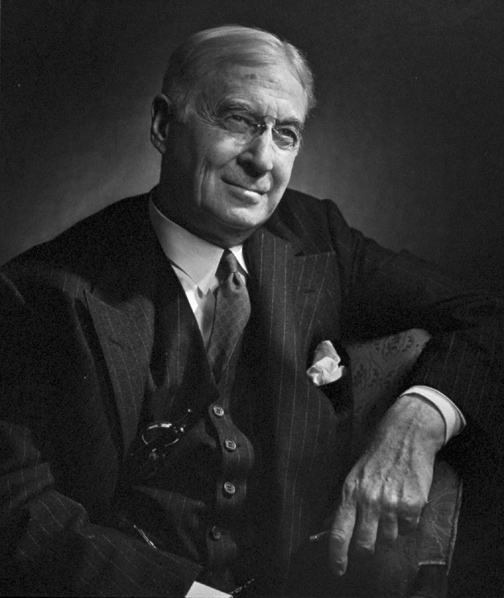
During World War II, Baruch continued to advise the government; they were offered a number of very useful economic innovations - for example, it was he who suggested starting to stockpile rubber and tin that were extremely necessary for the military industry of that time and proposed to start creating synthetic rubber - there was clearly not enough natural for the needs of the army.
Baruch is remembered by many for his love of walking in Washington's Lafayette Park and New York's Central Park; quite often during such walks on the most ordinary park benches, issues of serious state importance were resolved. In 1960, as a kind of gift for his 90th birthday, a memorial bench was erected in Lafayette Park opposite the White House in his honor.
Bernard Mannes Baruch is an American financier, stock speculator, as well as a politician and statesman. Bernard Baruch was born on August 19, 1870 in Kempden, South Carolina and was the second of four sons, Simon and Bell Baruch. His father, Simon Baruch (1840-1921), a German immigrant of Jewish origin, immigrated to the United States from Germany in 1855. A physician by profession, he served in the southern army during the civil war and was one of the founders of physiotherapy.
The beginning of the financial career of Bernard Baruch
In 1881, the family moved to New York, where Bernard entered City College of New York. After graduating from college, Bernard Baruch joined A. A. Housman and Company.
Moving up the career ladder, he became a broker and then a partner of A. A. Housman and Co., and seven years later already owned an eighth part of this brokerage firm. The source of his income was a portion of the commission he received from each client's transaction.
By pooling his funds with those he managed to borrow from his family, Bernard Baruch bought a place on the New York Stock Exchange in 1898. Alas, the first experience was a failure. Bernard again - and then and again - had to seek help from relatives. One day his father told him that $ 500 was all the family had left for a rainy day. But it was with these five hundred that Bernard Baruch began his ascent to the Wall Street Olympus.
From the very beginning, his behavior on the stock exchange seemed strange to many. His market launch and early successes were highly disapproved. For example, he called him nothing but "Card sharper"... At first glance, these accusations in the era of the free market seem strange - after all, Morgan himself did not make his fortune in white gloves. But the methods of Bernard Baruch surprised even the great schemers. At first, he did not carry out takeovers of weak companies, popular at that time, with the aim of their subsequent resale. Nor did he carry out any machinations to artificially raise the price of individual shares.
A stock speculator is a person who watches the future and acts before it becomes present.
His methods were also far from scrupulous consideration of fundamental factors. Although the stock market was on the rise at that time, Bernard Baruch actively used the tricks of the fall. In his own opinion, it is impossible to buy at the low and sell at the high. And so he often went against the market, selling when many were buying, and vice versa. Without going into the intricacies of the company and not paying attention to the rumors spread about it, Baruch worked on the general market movements. And in this regard, his operations can be compared with style.
With the growth of Bernard M. Baruch's fortune, so did his capabilities. He could already afford to engage in direct investment. For example, on his capital was founded the Texasgulf Inc. company, which was engaged in services in the then growing oil industry.
However, he was not interested in participating in the management of this company. And he did not go further than financing its creation. Although Texasgulf Inc. over time, it turned into a fairly profitable company, Baruch had only a small part of this wealth, since after numerous share issues his share was greatly reduced.
They began to reckon with Bernard Baruch, and rarely large transactions took place without consulting him. He was called the owner of a large fortune, his speculation on the stock exchange was feared no less than the actions of J.P. Morgan or Joseph Kennedy. So Baruch, who did not seek to trade exclusively on insider information, received many opportunities. profitable investment capital.
By 1903, he had his own brokerage firm, Baruch Brothers, and at 33 he became a millionaire. Despite the flourishing practice of creating various trusts for the purpose of market manipulation at that time, Bernard Baruch conducted all his operations alone. For which he received the nickname "The lone wolf of Wall Street"... Even becoming a millionaire, Baruch did not forget how he lost all his money in the stock market several times. Therefore, in 1907, he spent $ 55 thousand to buy 15 thousand acres of land in his homeland - South Carolina. According to his calculations, in the event of another fall in prices on the stock exchange, this land would not leave him without a livelihood. In the same year, he bought a fairly stable company that was engaged in trade mainly between England and the United States - M. Hentz & Co.
Bernard Baruch's political career
 Bernard Baruch's active penetration into political life began in 1912. With his money, he supported Woodrow Wilson in his presidential company. Baruch contributed $ 50,000 to the Democratic Fund. In gratitude for this, Wilson appointed him to the Department of National Defense in 1916. Immediately after Bernard Baruch took up his first public office, rumors spread on the stock exchange that he was using his position for insider trading. In 1917, they even conducted an investigation against him, accusing him of disclosing secret documents.
Bernard Baruch's active penetration into political life began in 1912. With his money, he supported Woodrow Wilson in his presidential company. Baruch contributed $ 50,000 to the Democratic Fund. In gratitude for this, Wilson appointed him to the Department of National Defense in 1916. Immediately after Bernard Baruch took up his first public office, rumors spread on the stock exchange that he was using his position for insider trading. In 1917, they even conducted an investigation against him, accusing him of disclosing secret documents.
While checking his deals, the investigation stumbled upon transactions he had made several months earlier. According to estimates, Bernard Baruch earned about $ 1 million from the purchase and resale of shares in factories that fall into the sphere of his interests in government positions a month later.
However, it was not possible to dump him. Baruch built his defense on the basis that he created all his fortune on the resale of securities, and in this sense, the last operations were no different from the previous ones.
And already in 1918, Bernard Baruch became the US Secretary of Defense. The investigation resulted in him selling his place on the stock exchange, but his involvement in the distribution of military orders gave him much more opportunities to make money. And he has not completely retired from investments. Only now they were more targeted. Baruch's favorites were companies producing weapons and various military ammunition.
The main goal of the stock exchange is to fool as many people as possible
According to some reports, by the end of the First World War, Bernard Baruch owned shares in most factories that carried out military orders. Naturally, hefty funds received from the state budget for the factories remained in his pocket. It is said that by the end of the war, Bernard Baruch's fortune had increased to $ 200 million.
After the war, Bernard Baruch did not slow down his political ambitions. By successfully investing his money in a career as a politician, he could seriously influence the solution of various issues of the US economy. After Woodrow Wilson, he remained a constant companion of Presidents Warren Harding, Herbert Hoover, Franklin Roosevelt and Harry Truman. Indeed, his place in politics gave him much more informationthan other traders.
So, for the Great Depression of 1929, Baruch was fully prepared. Back in 1928, he sold all of his shares and bought bonds with the proceeds. And on October 24, 1929, the famous "Black Tuesday" of the American stock exchange, Baruch appeared in its hall with Winston Churchill. And they witnessed the second largest US stock market crash. It is said that Bernard Baruch appeared on the stock exchange with Churchill only to demonstrate to him his power over the market.
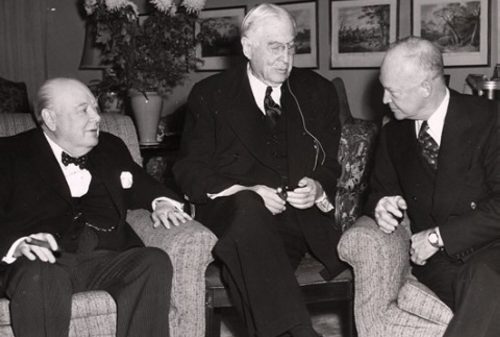
Although Bernard Baruch did not get rich in the Great Depression, by all accounts, he could well have done it. And after the Great Depression, Baruch continued to enjoy his privileged position. One can only guess how much money he made to abolish the gold standard.
 This standard existed until April 1933, when it was canceled by President Franklin Roosevelt. In order to bring the country out of the depression, the government announced the purchase of gold from the population. Refusal to hand over gold could be punished with a fine or long imprisonment. In exchange for gold, non-redeemable paper money was issued. And already on October 22, 1933, as soon as most of gold was surrendered, Roosevelt announced the devaluation of the dollar, that is, the government from that moment began to buy gold at an increased price. Now one dollar could buy only 1/35 of an ounce, while before the abolition of the gold standard - 1/20 of an ounce.
This standard existed until April 1933, when it was canceled by President Franklin Roosevelt. In order to bring the country out of the depression, the government announced the purchase of gold from the population. Refusal to hand over gold could be punished with a fine or long imprisonment. In exchange for gold, non-redeemable paper money was issued. And already on October 22, 1933, as soon as most of gold was surrendered, Roosevelt announced the devaluation of the dollar, that is, the government from that moment began to buy gold at an increased price. Now one dollar could buy only 1/35 of an ounce, while before the abolition of the gold standard - 1/20 of an ounce.
Being close to the president, Bernard Baruch undoubtedly took advantage of the opportunity that presented itself to make money on gold. But not only on it. According to some reports, by mid-1933, Baruch owned options for a third of the silver reserves known in the world at that time. A few months later, while the hype about the devaluation of gold had not yet subsided, Roosevelt announced that the price of the redemption of silver would double.
The official pretext was to help the miners working in the silver mines. But in reality, Bernard Baruch received the subsidy.
All the failures I know of, all the mistakes I have made, all the follies that I have observed in my personal and public lifewere the result of ill-considered actions
During World War II, Baruch's role as an authority on the war economy became even more prominent.
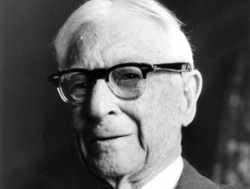 It is believed that he had a hand in the plan for the reconversion of the American economy, and in general, the country's economic policy, in the opinion of many, was highly dependent on Baruch. Later, he resolved many issues related to the proliferation of nuclear technologies, and actively influenced American policy towards the USSR. But at the same time, his activity in the stock market has clearly declined. Bernard Baruch devoted himself entirely to politics, remaining "Gray cardinal" administration of the White House until his death in 1965.
It is believed that he had a hand in the plan for the reconversion of the American economy, and in general, the country's economic policy, in the opinion of many, was highly dependent on Baruch. Later, he resolved many issues related to the proliferation of nuclear technologies, and actively influenced American policy towards the USSR. But at the same time, his activity in the stock market has clearly declined. Bernard Baruch devoted himself entirely to politics, remaining "Gray cardinal" administration of the White House until his death in 1965.
Bernard Baruch's wife died much earlier than her husband. Their children are two daughters and one son, but there were no grandchildren from their daughters. It is not easy to build the pedigree of this great man, as many facts remain unknown.
Bernard Mannes Baruch is the author of the following books:
- My story.
We also offer to watch a video about Bernard Baruch
Bernard baruch
(birth name)
USA
Baruch's active penetration into political life began in 1912. With his money, he supported Woodrow Wilson in his presidential company. Baruch contributed $ 50 thousand to the Democratic Fund. In gratitude for this, Wilson appointed him to the Department of National Defense. During the First World War, he became the head of the Military Industrial Committee (eng. War Industries Board) and played a key role in the reorientation of American industry for military needs.
After World War I, he served on the Supreme Economic Council of the Versailles Conference and was the personal economic adviser to President T. W. Wilson. After Woodrow Wilson, he remained a constant companion of Presidents Warren Harding, Herbert Hoover, Franklin Roosevelt and Harry Truman. During World War II, President F. D. Roosevelt appointed Baruch chairman of the rubber shortage committee. In 1943, Baruch became an advisor to the director of the military mobilization department, D. Byrnes.
"Baruch's Plan"
Additional Information
Bernard Baruch was the first in the world to use the term Cold War on April 16 in a speech before the South Carolina House of Representatives to refer to the conflict between the United States and the Soviet Union.
Notes
Literature
- Bernard Mannes Baruch, Bernard Baruch Baruch: My Own Story. - New York: Buccaneer Books, 1993 .-- 337 p. - ISBN 156849095X
Links
- Baruch's Plan - Attempts to Destroy the Bomb - washprofile.ru

